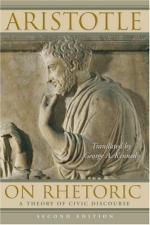|
This section contains 1,177 words (approx. 3 pages at 400 words per page) |

|
The Goal of Rhetoric is Persuasion Not Truth
In the first chapter of the first book, Aristotle distinguishes dialectic from rhetoric. In order to understand the significance of this distinction, it is obviously necessary to understand what dialectic is. Dialectic might be reasonably considered equivalent with what is commonly called "logic" in the modern world. It is all of the principles of reasoning, primarily deduction (where a conclusion is derived from two premises) and induction (where a conclusion is derived from a number of empirical examples). The principal goal of dialectic is sound reasoning and, ultimately, the truth. This explains why Aristotle says sophists—false, dishonest pseudo-philosophers—are not dialectics. Rhetoric, on the other hand, is concerned not with the truth, but primarily with being persuasive. Thus, a dishonest sophist is still called a sophist, for he may still be persuasive. The reader will note that the...
|
This section contains 1,177 words (approx. 3 pages at 400 words per page) |

|




